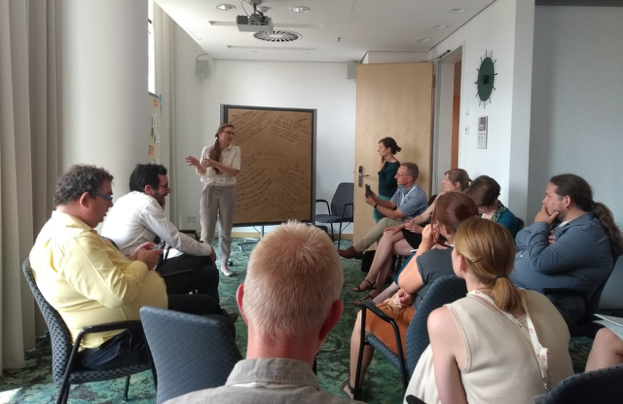Good Governance vs Safeguards + Gender: Effective guiding principles of GIZ?

Photo caption: Side event on “empowerment of indigenous peoples and local communities” supported by the Biodiversity Working Group. Photo credits: GIZ / Oemar Idoe
In the frame of the GIZ Sectoral FATA Conference, the Biodiversity Working Group supported a side event on “empowerment of indigenous peoples and local communities – reality or just lip service?” together with other regional projects and the GIZ S+G desk.
The workshop was set before the background that transitions need to be environmentally just, ensuring that existing inequalities are not reproduced or exacerbated while aiming to address global environmental threats, such as climate change or biodiversity loss. Drawing on the experiences from different “green sector” projects in the region, the workshop addressed the following questions: How high is the risk that projects implemented by the GIZ have undesirable negative impacts on local communities, who are among some of the most vulnerable actors? Which possibilities does the GIZ have to empower this stakeholder group and ensure that they participate effectively in a just transition? How can we avoid that their participation simply ends up being “lip service”?
As one of the outcomes of the workshop, some recommendations were formulated on the potential of improving available tools to avoid unintended negative impacts from GIZ projects and strengthen the role of local community participation in the design and implementation of our projetcs. The results of the workshop will also feed into a discussion paper aimed at guiding GIZ projects on how Protected Area Governance Assessments can contribute to fulfilling the GIZ Safeguards + Gender standards. This discussion paper is currently under development by SNRD Asia’s Biodiversity Working Group.
Under the motto of “Just Transition” 300 participants from GIZ all over the world discussed how our work can support change processes that are sustainable, socially-just and looking into the future. Highlights of the conference included an inspirational talk by Dr. Auma Obama presenting her humanitarian work for the Sauti Kuu Foundation in Kenya as well as the opportunity to discuss with the head of the national “Coal Commission” about Germany’s strategy of phasing out of coal by 2038.
The FATA is a regular sectoral GIZ Conference. This FATA brought together experts working in the fields of climate change, biodiversity, energy, infrastructure and other green sectors and took place on 3. – 6. June 2019 in Berlin, Germany.

